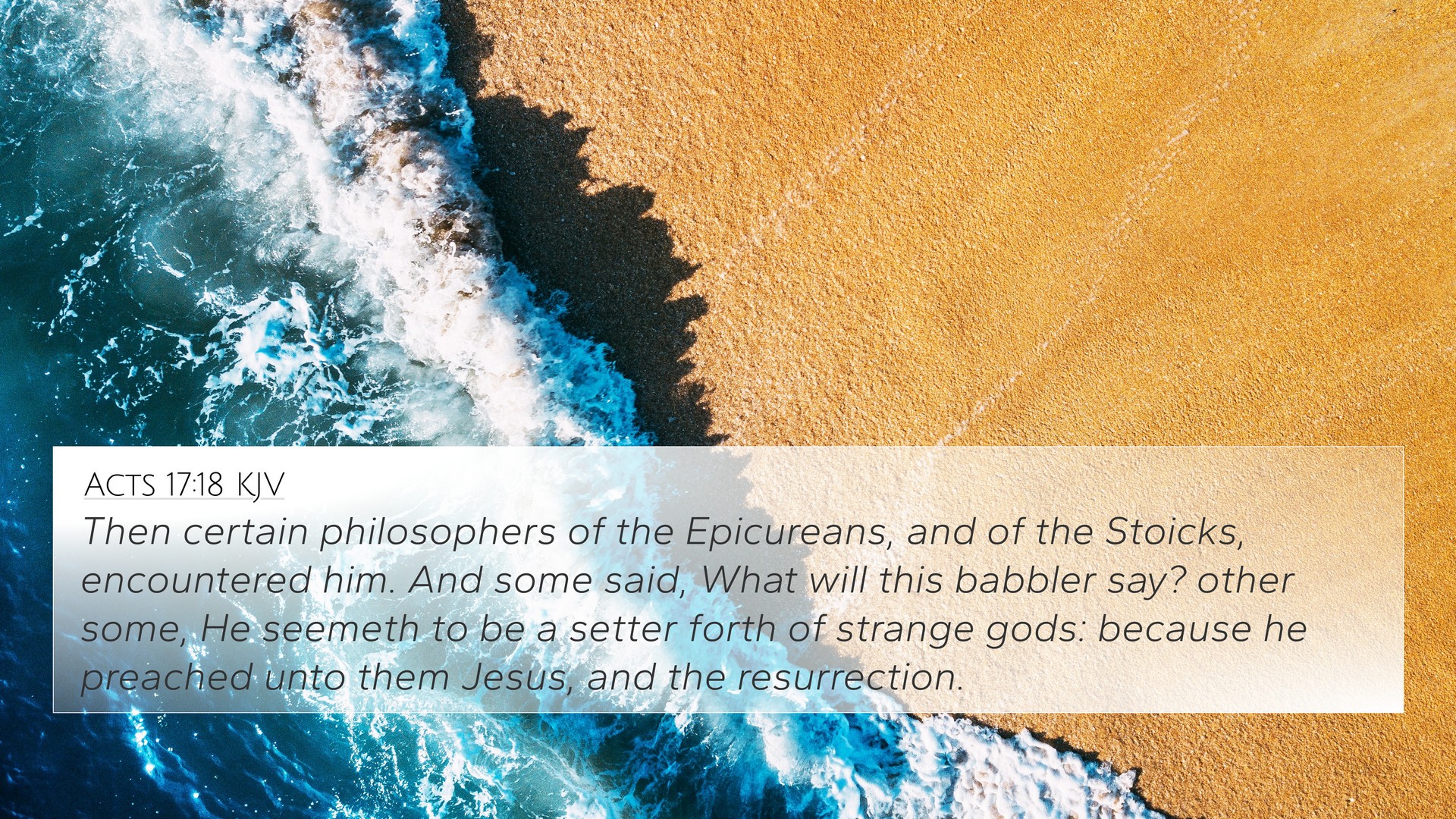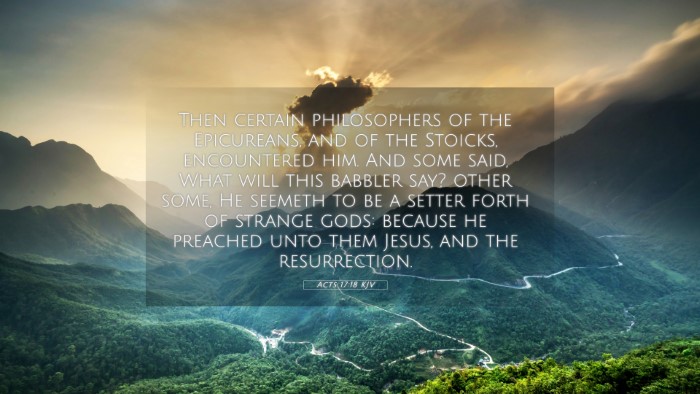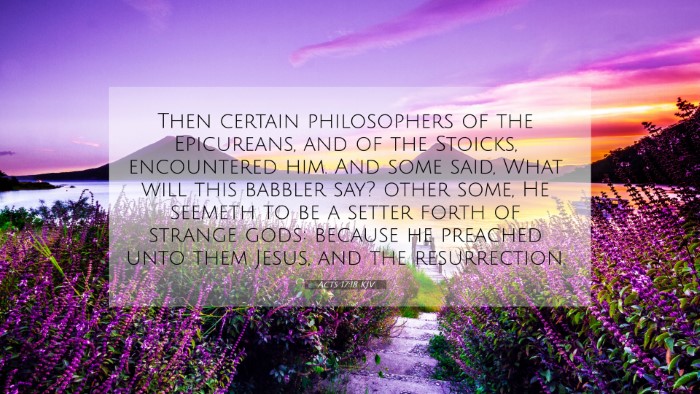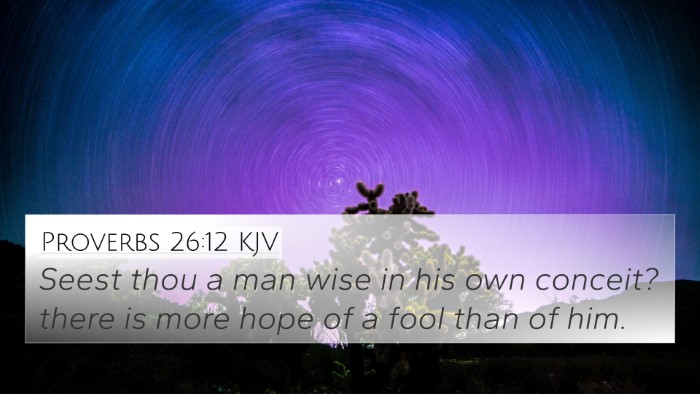Meaning of Acts 17:18
Acts 17:18 states: “Then certain Epicurean and Stoic philosophers encountered him. And some said, 'What does this babbler want to say?' Others said, 'He seems to be a proclaimer of foreign gods,' because he preached to them Jesus and the resurrection.” This verse illustrates the diverse philosophical encounters and the development of ideas in early Christian apologetics.
Contextual Overview
This verse is situated in Paul’s missionary journey to Athens, where he engages in critical discussions with local philosophers. This particular verse highlights the confrontation between differing worldviews, as various Greek philosophical schools respond to Paul's teachings on Jesus and the resurrection.
Interpretations from Commentaries
Matthew Henry's Commentary
Matthew Henry notes that Paul’s engagement with Epicurean and Stoic philosophers represents a pivotal moment in the spread of Christianity. The reference to Paul as a “babbler” encapsulates the skepticism faced by those introducing new ideas. Henry emphasizes that Paul is perceived as a foreigner, suggesting the struggle of early Christians to communicate their beliefs in a predominantly polytheistic culture.
Albert Barnes’ Commentary
Barnes provides insight into the distinction between the Epicureans and Stoics, noting that the former held a materialistic view of the world while the latter adhered to a more ethical rationalism. This clash of ideas sets the stage for Paul to present Christian doctrine, which would introduce a new understanding of divinity and resurrection, compelling their curiosity.
Adam Clarke’s Commentary
Adam Clarke discusses the philosophical implications at play, making connections with the resurrection of Christ, which provided a point of contention between the secular philosophies and Christian doctrine. Clarke emphasizes that the term “babbler” underscores the initial lack of respect for Paul’s message, which was later transformed into deep interest and discussion.
Thematic Connections
This verse invites exploration into various themes, including:
- Philosophy and Theology: The interaction between secular philosophy and spiritual truths.
- Faith and Reason: The reconciliation of belief with logical understanding.
- Cross-Cultural Communication: How early Christians communicated their faith across cultural divides.
- Resurrection as a Central Belief: The pivotal role of the resurrection in Christian teaching.
Bible Cross-References
Acts 17:18 connects with several key Bible verses that further illuminate its meaning:
- 1 Corinthians 15:12-22 - Paul’s explanation of the resurrection of Christ and its significance.
- Colossians 2:8 - Warning against philosophy that distracts from Christ.
- Romans 1:20 - Understanding God through creation, relevant to debates with philosophers.
- Acts 14:15-17 - Paul addresses idolatry and preaches the living God.
- John 1:1-14 - The Word as a foundation for understanding Christ's divine nature.
- Philippians 2:9-11 - The exaltation of Christ and acknowledgment as Lord.
- John 5:28-29 - The promise of resurrection for all, resonating in Paul’s message.
Understanding Connections Between Bible Verses
Understanding Acts 17:18 includes examining its connections to a broader scriptural context. It serves as a profound example of:
- Bible verses that relate to each other: Acts 17:18 builds upon the themes introduced in the Old Testament and the teachings of Jesus.
- Comparative Bible verse analysis: Confrontations between philosophical thought and spiritual truths emerge as a critical dialogue within scripture.
- Inter-Biblical dialogue: The discussions represent a continuum of theological development from Old Testament prophecy to New Testament fulfillment.
Tools for Bible Cross-Referencing
For deeper exploration and study on connecting these themes, consider utilizing:
- Bible concordance: Helps locate specific verses based on keywords.
- Cross-reference Bible study materials: Guides for identifying thematic connections.
- Bible reference resources: Tools for exploring broader biblical themes.
Conclusion
Acts 17:18 provides an essential lens for understanding the challenges and opportunities the early church faced in articulating Christian doctrine within a skeptical and diverse philosophical landscape. Engaging with this verse through the voices of notable commentaries enhances our comprehension of scripture, its themes, and its interconnectedness.

















